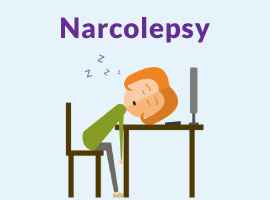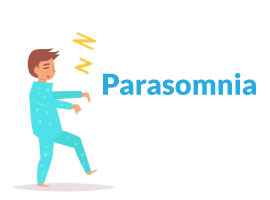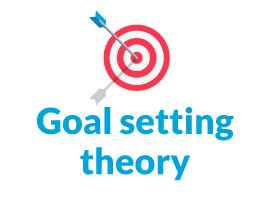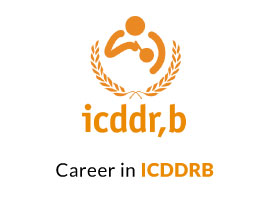Hypersomnia is a medical term used to describe a condition characterized by excessive daytime sleepiness or prolonged and excessive episodes of sleep. People with hypersomnia often find it difficult to stay awake during the day, even when they have had a full night's sleep. This excessive sleepiness can interfere with daily activities, work, and social functioning.
Types of hypersomnia
There are several types of hypersomnia, each with its own specific characteristics. Here are a few types of hypersomnia:
1. Idiopathic Hypersomnia: This is a condition where individuals experience excessive daytime sleepiness without a clear cause. People with idiopathic hypersomnia might sleep for long durations at night but still struggle with daytime sleepiness.
2. Narcolepsy: Narcolepsy is a neurological disorder characterized by excessive daytime sleepiness, sudden and uncontrollable episodes of falling asleep (called sleep attacks), and other symptoms like cataplexy (sudden loss of muscle tone triggered by emotions), sleep paralysis, and hallucinations when falling asleep or waking up.
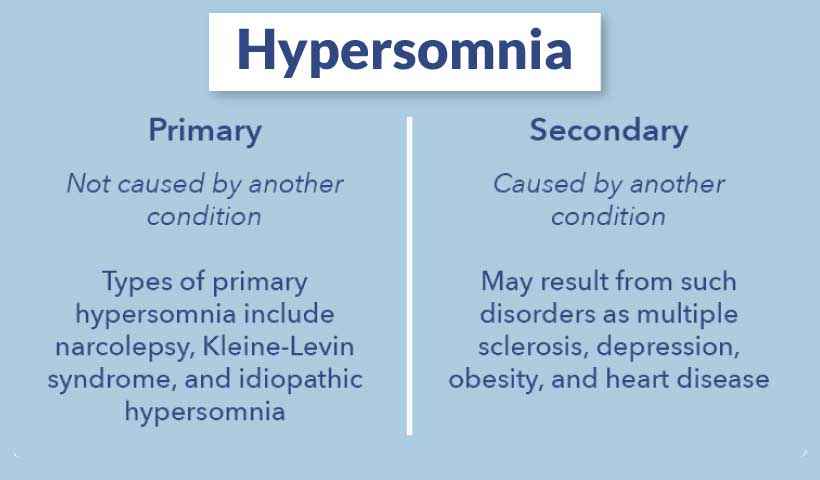
3. Kleine-Levin Syndrome: Also known as "Sleeping Beauty Syndrome," this rare disorder is characterized by recurring episodes of excessive sleepiness that can last for several days to weeks. Individuals with this syndrome might also experience changes in behavior and cognition during these episodes.
4. Recurrent Hypersomnia: This is a condition where individuals experience episodes of extreme sleepiness that recur over time, similar to narcolepsy or Kleine-Levin Syndrome but without the additional symptoms like cataplexy or hallucinations.
5. Posttraumatic Hypersomnia: This type of hypersomnia can occur after a head injury or trauma to the central nervous system. Excessive daytime sleepiness is a common symptom in individuals recovering from such injuries.
6. Medical or Psychiatric Conditions: Certain medical or psychiatric conditions, such as depression, sleep apnea, or thyroid disorders, can lead to excessive daytime sleepiness and could be considered a form of hypersomnia.
7. Sleep Apnea-related Hypersomnia: Sleep apnea is a condition where individuals experience interruptions in their breathing during sleep. This can lead to fragmented sleep and excessive daytime sleepiness as a result.
It's important to note that hypersomnia can have a significant impact on a person's daily life, affecting their productivity, cognitive function, and overall quality of life.
Hypersomnia Symptoms
There are some common symptoms of hypersomnia:
1. Excessive daytime sleepiness: The most prominent symptom of hypersomnia is an overwhelming and persistent urge to sleep during the day, even after a full night's sleep.
2. Prolonged nighttime sleep: People with hypersomnia might sleep for longer than the average person, yet still feel excessively tired during the day.
3. Difficulty waking up: Individuals with hypersomnia often find it challenging to wake up in the morning and may experience "sleep drunkenness," where they feel disoriented and groggy upon waking.
4. Difficulty maintaining wakefulness: Even if someone with hypersomnia manages to wake up, they may struggle to stay awake throughout the day, leading to episodes of unintentional napping.
5. Cognitive impairment: Excessive daytime sleepiness can lead to difficulties in concentrating, remembering things, and processing information, affecting overall cognitive function.
6. Impaired performance: Hypersomnia can impact a person's ability to perform daily tasks, including work, school, and social activities.
7. Anxiety and depression: The constant struggle with excessive sleepiness and the resulting impairment can lead to feelings of frustration, anxiety, and even depression.
8. Increased need for naps: People with hypersomnia may feel compelled to take long or frequent naps throughout the day to combat their sleepiness.
9. Automatic behaviors: In some cases, individuals with hypersomnia might engage in activities without full awareness or memory, similar to sleepwalking or sleep talking.
It's important to note that hypersomnia can have various underlying causes, such as sleep disorders like narcolepsy, medical conditions like sleep apnea or thyroid problems, certain medications, or even issues with the central nervous system.
Causes of hypersomnia
There are several potential causes of hypersomnia, ranging from medical conditions to lifestyle factors. It's important to note that a proper diagnosis should be made by a medical professional, as the underlying cause can vary from person to person. Some possible causes of hypersomnia include:
1. Primary Hypersomnia: This is a rare neurological disorder where excessive sleepiness occurs without an underlying medical condition. One subtype of primary hypersomnia is idiopathic hypersomnia.
2. Narcolepsy: Narcolepsy is a neurological disorder that disrupts the brain's ability to regulate sleep-wake cycles. It can lead to excessive daytime sleepiness, sudden sleep attacks, and cataplexy (sudden loss of muscle tone triggered by emotions).
3. Sleep Apnea: Obstructive sleep apnea is a condition where the airway becomes partially or completely blocked during sleep, leading to interruptions in breathing. People with sleep apnea often experience fragmented sleep and excessive daytime sleepiness.
4. Restless Legs Syndrome (RLS): RLS is characterized by uncomfortable sensations in the legs, often relieved by movement. It can lead to difficulty falling asleep and disrupted sleep, resulting in daytime sleepiness.
5. Medical Conditions: Certain medical conditions such as hypothyroidism, diabetes, multiple sclerosis, and neurological disorders can contribute to hypersomnia.
6. Medications: Some medications, particularly sedatives, antihistamines, and certain antidepressants, can lead to excessive daytime sleepiness as a side effect.
7. Depression: Depression is associated with changes in sleep patterns, and some individuals with depression may experience hypersomnia, finding it difficult to stay awake during the day.
8. Excessive Alcohol or Drug Use: Substance abuse, including alcohol and certain drugs, can disrupt sleep patterns and lead to daytime sleepiness.
9. Sleep Deprivation: Paradoxically, chronic sleep deprivation can result in symptoms resembling hypersomnia, as the body tries to compensate for lost sleep by inducing excessive daytime sleepiness.
10. Hypersomnolence Disorder: This is a diagnosis used when excessive daytime sleepiness is a prominent feature, but it doesn't fit into the criteria for other sleep disorders like narcolepsy or sleep apnea.
11. Genetics: Some individuals may have a genetic predisposition that makes them more prone to hypersomnia.
12. Lifestyle Factors: Poor sleep hygiene, irregular sleep schedules, and lack of physical activity can contribute to excessive daytime sleepiness.
Is hypersomnia dangerous?
Yes, hypersomnia can be dangerous. It can increase the risk of accidents, such as car crashes, falls, and injuries at work. People with hypersomnia may also have difficulty concentrating and remembering things, which can impact their work performance and relationships. Additionally, hypersomnia can lead to depression, anxiety, and social isolation.
Here are some of the specific dangers of hypersomnia:
• Increased risk of accidents: People with hypersomnia are more likely to fall asleep at the wheel or while operating machinery. This can lead to serious accidents, including fatalities.
• Difficulty concentrating and remembering things: Hypersomnia can make it difficult to focus on tasks and remember things. This can impact work performance, school work, and relationships.
• Depression and anxiety: Hypersomnia can lead to depression and anxiety. These conditions can further impair a person's ability to function and enjoy life.
• Social isolation: Hypersomnia can make it difficult to participate in social activities. This can lead to social isolation and loneliness.
Hypersomnia Test
There are a few different tests that can be used to diagnose hypersomnia. These tests may include:
• Polysomnography (PSG): This is a sleep study that records your brain activity, eye movements, heart rate, breathing, and oxygen levels while you sleep. PSG can help doctors identify sleep disorders such as sleep apnea, narcolepsy, and idiopathic hypersomnia.
• Multiple sleep latency test (MSLT): This test measures how quickly you fall asleep during the day. You will be given five opportunities to nap during the day, and doctors will measure how long it takes you to fall asleep each time. A short sleep latency (falling asleep quickly) is a sign of hypersomnia.
• Epworth Sleepiness Scale (ESS): This is a questionnaire that measures how sleepy you feel during the day. The ESS can help doctors assess the severity of your hypersomnia.
• Blood tests: Blood tests can be used to rule out other medical conditions that can cause excessive sleepiness, such as anemia, thyroid problems, and diabetes.
If you are experiencing excessive sleepiness, it is important to see a doctor to get a proper diagnosis. Hypersomnia can be a sign of a serious medical condition, so it is important to get treatment as soon as possible.
In addition to the tests mentioned above, your doctor may also ask you to keep a sleep diary. A sleep diary is a record of your sleep habits, including how much sleep you get at night, how often you wake up, and how sleepy you feel during the day. This information can help your doctor diagnose your hypersomnia and develop a treatment plan.
How to cure hypersomnia
We can offer some general suggestions that might help with hypersomnia. Hypersomnia is a medical condition characterized by excessive daytime sleepiness, often leading to long and frequent naps. It is important to consult a medical professional for accurate diagnosis and personalized treatment options. Here are some strategies that might be considered:
1. Medical Evaluation: The first step is to consult a doctor, preferably a sleep specialist or a neurologist, to determine the underlying cause of your hypersomnia. There could be various medical conditions contributing to your symptoms, such as sleep apnea, narcolepsy, or other sleep disorders.
2. Sleep Hygiene: Maintain a regular sleep schedule by going to bed and waking up at the same times each day, even on weekends. This helps regulate your body's internal clock and improve overall sleep quality.
3. Healthy Lifestyle: Adopt a balanced diet, exercise regularly, and avoid excessive caffeine and alcohol intake. A healthy lifestyle can positively impact your sleep patterns.
4. Limit Naps: While short naps can be refreshing, long or frequent naps during the day might exacerbate hypersomnia. Try to limit naps to around 20-30 minutes and avoid napping close to bedtime.
5. Stimulus Control: Use your bed primarily for sleep and intimacy. Avoid using electronic devices, working, or watching TV in bed as these activities can interfere with your body's association of bed with sleep.
6. Cognitive Behavioral Therapy (CBT): CBT for insomnia (CBT-I) can help address negative thought patterns and behaviors associated with sleep, promoting healthier sleep habits.
7. Medication: In some cases, doctors might prescribe medications to help manage hypersomnia. Stimulant medications (like modafinil or armodafinil) are sometimes used to improve wakefulness during the day. However, these should only be taken under the guidance of a healthcare professional.
8. Treat Underlying Conditions: If an underlying medical condition like sleep apnea or narcolepsy is causing your hypersomnia, treating that condition may alleviate the excessive sleepiness.
9. Light Exposure: Exposure to natural light during the day can help regulate your body's internal clock and improve sleep quality. Spend time outside or consider using light therapy lamps if recommended by your doctor.
10. Stress Management: High levels of stress and anxiety can disrupt sleep. Engage in relaxation techniques such as deep breathing, meditation, or yoga to manage stress.
Remember, the right approach to treating hypersomnia will depend on the underlying cause and your individual health situation.

